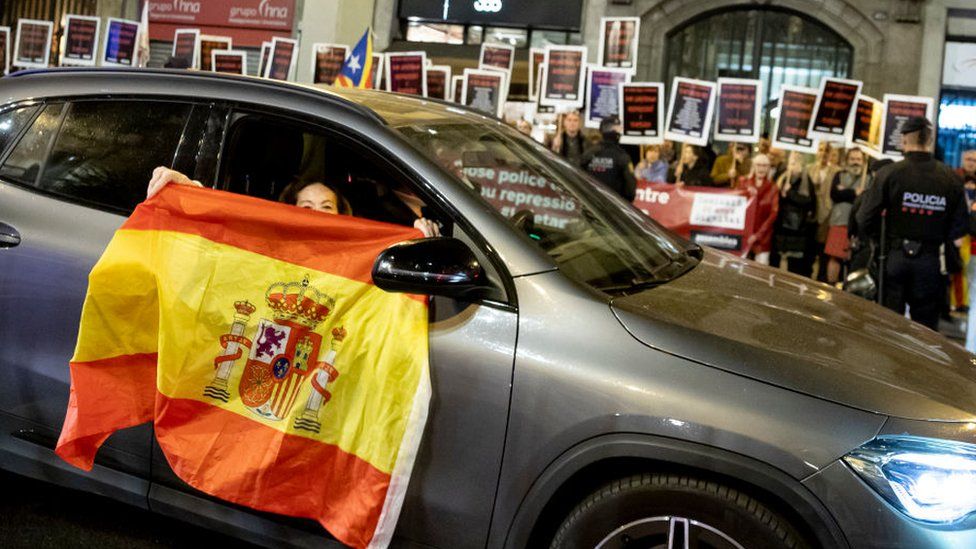Spain’s acting prime minister, Pedro Sánchez, has agreed a controversial amnesty deal with a Catalan separatist party that brings him a step closer to four more years in government.
The Socialist leader came second in July’s general elections, but the conservative Popular Party who won were unable to form a majority.
As part of a deal to clinch another term in office, Mr Sánchez has promised to pass an amnesty law.
The plan has prompted widespread anger.
Right-wing protesters have taken to the streets in Madrid and other cities in recent days, objecting to the law to grant amnesty to hundreds of Catalan politicians and activists “directly or indirectly” related to the events surrounding the failed bid to secede from Spain in 2017.
Now Popular Party (PP) figures have accused the acting prime minister of writing a “blank cheque for the independence movement”. Madrid Mayor Isabel Díaz Ayuso said the Socialists were “selling a nation with centuries of history” with an attack on Spain’s rule of law.
In an indication of the febrile atmosphere surrounding the deal, a former Catalan leader of the PP and founder of far-right Vox was shot in the face and wounded on a street in Madrid. Alejo-Vidal Quadras, 78, had earlier condemned the “infamous pact”, warning that it would make Spain a “totalitarian tyranny”.
Before Thursday’s agreement, Pedro Sánchez had already sealed a deal with the pro-independence Catalan Republican Left (ERC), which is in power in Spain’s north-eastern region.
Now his negotiators have also clinched an agreement with the more radical Together for Catalonia (JxCat), which is led by Carles Puigdemont, who fled to Brussels to avoid being sent to jail after leading the breakaway independence vote six years ago.
While Mr Puigdemont went into exile, nine other Catalan leaders were jailed for sedition before being pardoned by Mr Sánchez in 2021. The crime of sedition has since been removed from the penal code.

“It’s an agreement that provides a historic opportunity to resolve a conflict that can and should only be dealt with politically,” said Santos Cerdán, the Socialist party secretary who negotiated the deal with Mr Puigdemont.
“It’s necessary to form a progressive government as soon as possible, that gives stability to Spain and that fulfils the mandate of the people in last elections.”
Mr Puigdemont said the deal marked a step towards resolving “the historic conflict between Catalonia and Spain”.
The leader of the conservative PP, Alberto Núñez Feijóo, spoke of a day that would go down “in the dark history of our country”. He had earlier tried and failed to form a government despite winning the general election.
Isabel Díaz Ayuso told Spanish TV that the Socialists had betrayed all their principles. Accusing the acting prime minister of deciding to stay in office despite losing the election, she said his party was guilty of sneaking “a dictatorship through the back door”.
The controversial amnesty law will be put before parliament in the coming days and, assuming it passes, the next step will be for an investiture debate and a vote around Thursday next week.
The European Commission said it had written to the caretaker government in Spain for information about the draft law. A spokesman said it had been contacted “by a large number of citizens and stakeholders who had concerns about [the amnesty]”.

